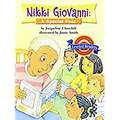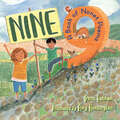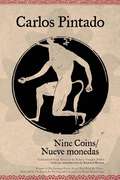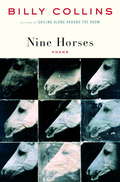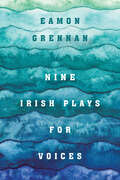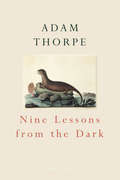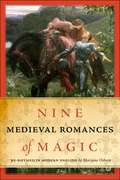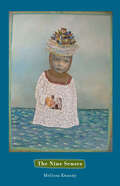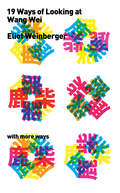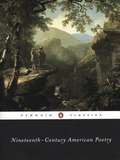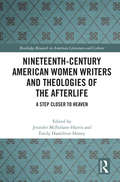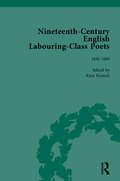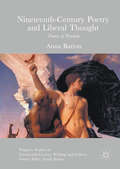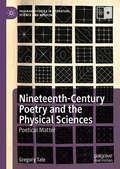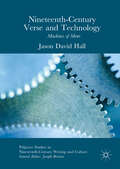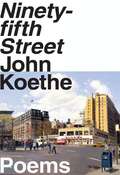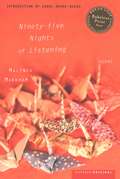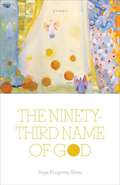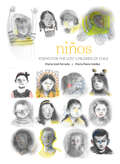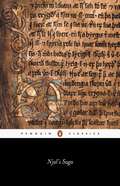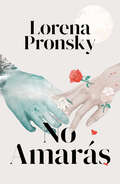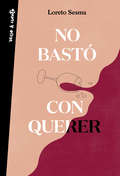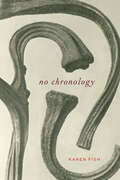- Table View
- List View
Nikki Giovanni: A Special Poet (Leveled Readers 2.6.3)
by Jacqueline ChurchillA grade 2 level children's book about the poet Nikki Giovanni
Nine: A Book of Nonet Poems
by Irene LathamFans of clever poetry and numbers rejoice! Nine is a book of nine-line poems called nonets, all about the number nine!Hey!Hi there!Love nonets?I'm sure you do.What are they, you ask?You don't know a nonet?Not even one little one?Actually, they're all the same size!They're poems, of course--and here's your first!Each poem in this clever collection is a nonet: a nine-line poem that starts with nine syllables in the first line and ends with one syllable in the ninth line (or the reverse). But these nonets go even further! Every one is also written with the number nine at its heart. There's plenty to love and learn: topics include the nine months it takes a baby to be born, cats' nine lives, baseball's nine players, and the nine-banded armadillo. Some feature history, such as the Little Rock Nine, the spacecraft Apollo 9, the ninth president; others explain idioms, like "dressed to the nines," "cloud nine," and "the whole nine yards." Explore these and more with nonets galore!
Nine Coins/Nueve monedas
by Carlos PintadoThe winner of the Paz Prize for Poetry, presented by the National Poetry Series; published in both English and Spanish. —The winner of the Paz Prize for Poetry, presented by the National Poetry Series; published in both English and Spanish. —Carlos Pintado is a finalist for the 2015–2016 CINTAS Foundation Fellowship in Creative Writing —Named a Notable Translation of 2015 by World Literature Today —The Moon has been selected as one of Vancouver Poetry House’s 10 Best Poems of 2015 Translated by Hilary Vaughn Dobel. Nine Coins/Nueve monedas is a palimpsest of love, fears, dreams, and the intimate landscapes where the author seeks refuge. These poems appear like small islands of salvation, covered with the brief splendor of the coins people sometimes grab hold of, taking the form of a very personal and often devastating map. Each poem is a song at the edge of an abyss; an illusory gold coin obtained as a revelation; a song of hope and understanding. The volume’s dreamlike geography prompts the reader to revisit the thread, the labyrinth, and the Minotaur’s legends. The night streets of South Beach, Alexandria, and many other cities, lit by the fading torches, seem to guide us in conversation with characters who are long dead. The Paz Prize for Poetry is presented by the National Poetry Series and The Center at Miami Dade College. This annual award—named in the spirit of the late Nobel Prize–winning poet, Octavio Paz—honors a previously unpublished book of poetry written originally in Spanish by an American resident. An open competition is held each May, when an esteemed Spanish-speaking poet selects a winning manuscript. The book will be published in a bilingual edition by Akashic Books. The winning poet will also receive a $2,000 cash prize.
Nine Horses: Poems
by Billy CollinsNine Horses, Billy Collins's first book of new poems since Picnic, Lightning in 1998, is the latest curve in the phenomenal trajectory of this poet's career. Already in his forties when he debuted with a full-length book, The Apple That Astonished Paris, Collins has become the first poet since Robert Frost to combine high critical acclaim with broad popular appeal. And, as if to crown this success, he was appointed Poet Laureate of the United States for 2001-2002, and reappointed for 2002-2003. What accounts for this remarkable achievement is the poems themselves, quiet meditations grounded in everyday life that ascend effortlessly into eye-opening imaginative realms. These new poems, in which Collins continues his delicate negotiations between the clear and the mysterious, the comic and the elegiac, are sure to sustain and increase his audience of avid readers.From the Hardcover edition.
Nine Irish Plays for Voices
by Eamon GrennanA vibrant collection of short plays bringing Irish history and culture alive through an extraordinary collage of documents, songs, poems, and texts.In Nine Irish Plays for Voices, award-winning poet Eamon Grennan delves deep into key Irish subjects—big, small, literary, historical, political, biographical—and illuminates them for today’s audiences and readers. These short plays draw from original material centering on important moments in Irish history and the formation of the Irish Republic, such as the Great Famine and the Easter Rising; the lives of Irish literary figures like Yeats, Joyce, and Lady Gregory; and the crucial and life-changing condition of emigration.The rhythmic, musical, and vivid language of Grennan’s plays incorporates traditional song lyrics, lines of Irish poetry, and letters and speeches of the time. The result is a dramatic collage that tells a story through the voices of characters contemporary to the period of the play’s subject. By presenting subjects through the dramatic rendering of the human voice, the plays facilitate a close, intimate relationship between players and the audience, creating an incredibly powerful connection to the past. Historical moments and literary figures that might seem remote to the present-day reader or audience become immediate and emotionally compelling.One of the plays, Ferry, is drawn entirely from the author’s imagination. It puts unnamed characters who come from the world of twentieth-century Ireland on a boat to the underworld with the philosopher Ludwig Wittgenstein. On their journey the five strangers, played by two voices, tell stories about their lives, raising the question of how language both captures and transforms lived experience. Addressing the Great Famine, Hunger uses documentary evidence to give audiences a dramatic feel for what has been a silent and traumatic element in Irish history. Noramollyannalivialucia: The Muse and Mr. Joyce is a one-woman piece that depicts James Joyce’s wife as an older woman sharing her memories and snippets from the works of her husband. Also included in this rich volume is the author’s adaptation of Synge’s Aran Islands, as well as Emigration Road, History! Reading the Easter Rising, The Muse and Mr. Yeats, The Loves of Lady Gregory, and Peig: An Ordinary Life.
Nine Lessons From The Dark
by Adam ThorpeAdam Thorpe's fourth collection continues his engagement with history: the living continuum that connects us with our near and distant past, nourishing and illuminating our present. Here are traces left of presence: Indian scratchings on rock, the nail-marks of destroyed frescoes, spoken fragments of war memories - petroglyphs that function as both memorials and re-awakenings, traceable with the finger of the imagination. And here, too, are images of the stilled, the stopped life: a snowed-up village, the paralysed victim of motor-neurone disease, a soft drink fermented in an old village cafe. From this rueful equilibrium of mid-life, Thorpe circles his own personal history, allowing regret and anticipation their Janus-like say. These are erudite, generous poems, formally versatile yet rich in startlingly original observation and a natural lyric grace. Performing his unique archaeology on lives lived, Adam Thorpe once again displays the range of his imagination and the depth of his humanity.
Nine Medieval Romances of Magic: Re-Rhymed in Modern English
by Marijane OsbornIn this book, Marijane Osborn translates into modern English nine lively medieval verse romances, in a form that both reflects the original and makes the romances inviting to a modern audience. All nine tales contain elements of magic- shapeshifters, powerful fairies, trees- that are portals to another world, and enchanted clothing and armor.
The Nine Senses
by Melissa KwasnyThe prize-winning author of Thistle shares “a quietly magnificent collection of prose poems” that explore how we connect to the world around us (Orion).Drawing inspiration from the work of Rene Char, Melissa Kwasny presents a new kind of prose poem in The Nine Senses. These experiments challenge the way we read sequentially, making each line equal to the next as disparate figures and topics appear side by side: Dylan Thomas, Roman water lines, Paul Celan, Shirin Neshat, anti-depressants, Buddhism, William Carlos Williams, Trakl, cancer, Beckett, Pound, Breton, the Iraq War, telekinesis, clairvoyance, Jaune Quick-to-See Smith, and Yeats, among many others.Through it all, Kwasny asks how we tie ourselves to the world when our minds are always someplace other than where we are? As bromides and aphorisms degrade, we are left with startling new realizations. Obliquely touching on the cancer of a friend, her own troubled relationship with her father, and the break-up of a nearly thirty-year partnership, Kwasny also questions mortality, temporality, and eternity. Kwasny then abandons abstraction with some very direct poems about her own cancer and diagnosis.
Nineteen Ways of Looking at Wang Wei (with More Ways)
by Eliot Weinberger Octavio PazA new expanded edition of the classic study of translation, finally back in print The difficulty (and necessity) of translation is concisely described in Nineteen Ways of Looking at Wang Wei, a close reading of different translations of a single poem from the Tang Dynasty—from a transliteration to Kenneth Rexroth’s loose interpretation. As Octavio Paz writes in the afterword, “Eliot Weinberger’s commentary on the successive translations of Wang Wei’s little poem illustrates, with succinct clarity, not only the evolution of the art of translation in the modern period but at the same time the changes in poetic sensibility.”
Nineteenth-Century American Poetry
by Various William SpengemannWhitman, Dickinson, and Melville occupy the center of this anthology of nearly three hundred poems, spanning the course of the century, from Joel Barlow to Edwin Arlington Robinson, by way of Bryant, Emerson, Longfellow, Whittier, Poe, Holmes, Jones Very, Thoreau, Lowell, and Lanier.
Nineteenth-Century American Women Writers and Theologies of the Afterlife: A Step Closer to Heaven (Routledge Research in American Literature and Culture)
by Jennifer McFarlane-HarrisThis collection analyzes the theme of the "afterlife" as it animated nineteenth-century American women’s theology-making and appeals for social justice. Authors like Harriet Beecher Stowe, Elizabeth Stuart Phelps, Martha Finley, Jarena Lee, Maria Stewart, Zilpha Elaw, Rebecca Cox Jackson, Catherine Maria Sedgwick, Elizabeth Palmer Peabody, Belinda Marden Pratt, and others wrote to have a voice in the moral debates that were consuming churches and national politics. These texts are expressions of the lives and dynamic minds of women who developed sophisticated, systematic spiritual and textual approaches to the divine, to their denominations or religious traditions, and to the mainstream culture around them. Women do not simply live out theologies authored by men. Rather, Nineteenth-Century American Women Writers and Theologies of the Afterlife: A Step Closer to Heaven is grounded in the radical notion that the theological principles crafted by women and derived from women’s experiences, intellectual habits, and organizational capabilities are foundational to American literature itself.
Nineteenth-Century English Labouring-Class Poets Vol 2
by John GoodridgeOver 100 poets of labouring class origin were published in Britain in the 18th and 19th centuries. Some were hugely popular and important in their day but few are available today. This is a collection of some of those poems from the 19th century.
Nineteenth-Century Poetry and Liberal Thought
by Anna BartonThis book explores the relationship between nineteenth-century poetry and liberal philosophy. It carries out a reassessment of the aesthetic possibilities of liberalism and it considers the variety of ways that poetry by William Wordsworth, Elizabeth Barrett Browning, Arthur Hugh Clough, George Meredith, Robert Browning, Matthew Arnold and Algernon Charles Swinburne responds to and participates in urgent philosophical, social and political debates about liberty and the rule of law. It provides an account of poetry's intervention into four different sites where liberalism has a stake: the self, the university, married life and the nation state and it seeks to assert the peculiar capacity of poetry to articulate liberal concerns, proposing poetic language as a means of liberal enquiry.
Nineteenth-Century Poetry and the Physical Sciences: Poetical Matter (Palgrave Studies in Literature, Science and Medicine)
by Gregory TatePoetical Matter examines the two-way exchange of language and methods between nineteenth-century poetry and the physical sciences. The book argues that poets such as William Wordsworth, Mathilde Blind, and Thomas Hardy identified poetry as an experimental investigation of nature’s materiality. It also explores how science writers such as Humphry Davy, Mary Somerville, and John Tyndall used poetry to formulate their theories, to bestow cultural legitimacy on the emerging disciplines of chemistry and physics, and to communicate technical knowledge to non-specialist audiences. The book’s chapters show how poets and science writers relied on a set of shared terms (“form,” “experiment,” “rhythm,” “sound,” “measure”) and how the meaning of those terms was debated and reimagined in a range of different texts.“A stimulating analysis of nineteenth-century poetry and physics. In this groundbreakingstudy, Tate turns to sound to tease out fascinating continuities acrossscientific inquiry and verse. Reflecting that ‘the processes of the universe’ werethemselves ‘rhythmic,’ he shows that a wide range of poets and scientists werethinking through undulatory motion as a space where the material and the immaterialmet. ‘The motion of waves,’ Tate demonstrates, was ‘the exemplary form inthe physical sciences.’ Sound waves, light, energy, and poetic meter were eachcharacterized by a ‘process of undulation,’ that could be understood as both aphysical and a formal property. Drawing on work in new materialism and newformalism, Tate illuminates a nineteenth-century preoccupation with dynamic patterningthat characterizes the undulatory as (in John Herschel’s words) not ‘things,but forms.’”—Anna Henchman, Associate Professor of English at Boston University, USA“This impressive study consolidates and considerably advances the field of physicsand poetry studies. Moving easily and authoritatively between canonical and scientistpoets, Nineteenth-Century Poetry and the Physical Sciences draws scientificthought and poetic form into telling relation, disclosing how they were understoodvariously across the nineteenth century as both comparable and competingways of knowing the physical world. Clearly written and beautifully structured,Nineteenth-Century Poetry and the Physical Sciences is both scholarly and accessible,a fascinating and indispensable contribution to its field.”—Daniel Brown, Professor of English at the University of Southampton, UK“Essential reading for Victorianists. Tate’s study of nineteenth-century poetry andscience reconfi gures debate by insisting on the equivalence of accounts ofempirical fact and speculative theory rather than their antagonism. Theundulatory rhythms of the universe and of poetry, the language of science and ofverse, come into new relations. Tate brilliantly re-reads Coleridge, Tennyson,Mathilde Blind and Hardy through their explorations of matter and ontologicalreality. He also addresses contemporary theory from Latour to Jane Bennett.” — Isobel Armstrong, Emeritus Professor of English at Birkbeck, University of London, UK
Nineteenth-Century Verse and Technology
by Jason David HallThis book repositions thinking about rhythm, meter and versification during the “Mechanical Age.” Cutting across disciplinary boundaries, the book examines the rhythmical workings of poems alongside not only Victorian theories of prosody and poetics but also contemporary thinking about labor practices, pedagogical procedures, scientific experiments, and technological innovations. By offering an exploded definition of meter—one that extends beyond conventional foot-based scansion—this book explicates the conceptual and, at times, material exchanges between poetic meter and machine culture. The machines of meter include mid-century theories of abstraction and technologies of smoothness and even spacing; a deeply influential, though rarely credited, system of metrical manufacture; verse produced by a Victorian automaton; the mechanics of the human body and mind and the meters that issued from them; and the promise of scientific machines to resolve metrical dilemmas once and for all.
Ninety-fifth Street
by John KoetheIn his eighth book of poems, John Koethe offers readers the reflections of a poet in midlife, an "aging child of sixty-two," passionately engaged with the world yet drawn to meditate on memory, time, and the mysteries of human existence. In Ninety-fifth Street, Koethe retraces narratives from his life and moves across various landscapes he once inhabited; in his hands these stories and places become poems of beauty, feeling, and poignant candor. Disarmingly conversational and always accessible, these new poems offer the pleasures of a lucid intelligence and a distinctive poetic voice, by turns contemplative and worldly, lyrical, witty, and elegiac.
Ninety-five Nights of Listening
by Malinda MarkhamMalinda Markham's peoms are inspired in part by her fascination with Japanese language, art, and literature. Her reactions to and interpretations of that country's history, culture, and people are in these verses, echoing with the voices and silences of women across time. Markham imagines the experiences of many women: a geisha laments her past in "Geisha Considered as Making," as a mother laments for her daughter's future in "Yield to This." Markham is intrigued with how language tries but ultimately fails to hold memory in place. She grapples with the translation of words and feeling and shows how this failure also brings a searching for belief - a word that repeats throughout these poems - in a world that cannot allow it. Writes Cole Swenson, "Markham's language has the delicacy of the fine bones of the inner ear; it is, itself, a form of listening - to insects, birds, traffic, to the world. Her listening brings things into being, catching the nuances of change, from season to season, culture to culture, impression to language. This is a radiant collection."
The Ninety-Third Name of God: Poems (Walter Lynwood Fleming Lectures in Southern History)
by Anya Krugovoy SilverAnya Krugovoy Silver’s debut collection considers the flawed and gaudy flesh as it turns toward a beloved’s embrace, toward the surgeon’s knife. Her poems both celebrate the sensual world and seek to transcend the body’s limitations through encounters with art, memory, and the divine. At once imagistic, lyrical, and meditative, Silver’s verse begins in the personal sphere and then looks outward toward the wider human experiences of illness, faith, fear, and love. From chemotherapy to doing laundry, from observation of deformed pussy willows to contemplation of the word “girl,” Silver does not shrink from life’s “blazonry of loss.” Instead, she ultimately affirms the possibility of praise and joy.
Niños: Poems for the Lost Children of Chile
by María José FerradaOn September 11, 1973, a military coup plunged Chile into seventeen long years of dictatorial rule. Only the return of democracy could reveal the full horrors of Augusto Pinochet&’s regime: 3,197 people dead or disappeared—including thirty-four children under the age of fourteen. This book is a stirring memorial to those victims and to the cost of extremism. Thirty-four poems—one for each child lost—consider the diverse hopes of these fragile young lives. From Alicia to Jaime, Héctor to Paola, Soledad to Rafael, they were brave and creative, thoughtful and strong. In these pages, some children watch for the changing seasons. Some listen for new sounds on rainy afternoons. And some can&’t wait for their next birthday. Featuring gentle, emotive poems and soft, pastel-toned illustrations, Niños is an unforgettable tribute to the children of Pinochet&’s Chile and all those threatened by political violence across the world.
Njal's Saga
by Leifur Eiricksson Robert CookWritten in the thirteenth century, Njal's Saga is a story that explores perennial human problems-from failed marriages to divided loyalties, from the law's inability to curb human passions to the terrible consequences when decent men and women are swept up in a tide of violence beyond their control. It is populated by memorable and complex characters like Gunnar of Hlidarendi, a powerful warrior with an aversion to killing, and the not-so-villainous Mord Valgardsson. Full of dreams, strange prophecies, violent power struggles, and fragile peace agreements, Njal's Saga tells the compelling story of a fifty-year blood feud that, despite its distance from us in time and place, is driven by passions familiar to us all.
No amarás
by Lorena PronskyNo amarás es un viaje de autodescubrimiento, sanación y transformación personal. Este libro es una esperanza para quien haya sobrevivido a una relación tóxica, así como también para cualquiera que esté transitando una ruptura o un duelo. Es momento de reparar viejas heridas y dejar que el amor regrese de manera saludable y segura. Relaciones dependientes, no correspondidas, patológicas o violentas. Vínculos que disparan contra nuestra autoestima o la del otro, y nos muestran que hay lugares donde amar resulta un acto imposible. Historias de las que nos resistimos a retirarnos, aunque quedarnos nos lastime. (Des)amores que nos golpean, que nos dañan, pero que por alguna potente y misteriosa razón permanecen en nuestra vida. Patrones que se repiten, con un mismo principio y un mismo final. En contra de nuestro propio deseo. ¿Cuáles son los motivos que nos llevan a habitar una y otra vez esos espacios de dolor, a encaminarnos al mismo inexorable destino de frustración y padecimiento? En estas páginas Lorena Pronsky nos propone una búsqueda, un camino. Nos invita a averiguar quiénes somos, qué nos lleva a incurrir reiteradamente en comportamientos y zonas que nos hacen daño. Indagar, tratar de entender; conocer nuestra propia verdad para hacer posible un ejercicio saludable del amor. Mientras que esto no suceda, el final de tu cuento, hagas lo que hagas, intentes lo que intentes, siempre será el mismo. Ahí, justo ahí, NO AMARÁS.
No bastó con querer
by Loreto SesmaEl nuevo poemario de Loreto Sesma, una de las autoras más conocidas y admiradas de la nueva generación de poetas. Un libro que transita por las penumbras del amanecer, en lo ambiguo de esa oscuridad que muta de repente en esperanza. No bastó con querer es un claroscuro de versos que hablan del poder que ejerce sobre nosotros el recuerdo, el olvido imposible, que nos destruye pero a la vez nos ha construido como lo que somos, en la resiliencia. Loreto Sesma dibuja con profundidad y alma el perfil de la dulce derrota del que ya sabe perder, de la victoria amarga del que conoce que será finita. Un conjunto de poemas sobre el dolor que llevamos en la maleta, el bagaje de las heridas del amor, pero también sobre la posibilidad de la luz. «Llega el día.Simplementerecoges todos tus pedazos del silencioy dices:esto es querer,pero ya no es amor».
No Chronology (Phoenix Poets)
by Karen FishIn No Chronology, Karen Fish’s third collection of poems, she investigates those moments when the boundary of everyday life merges with history, imagination, and art. Fish was trained as a visual artist, and this way of seeing is intrinsic to her approach to poetry. Fish’s reflections on art and life speak to our common experiences, and her power to illuminate the subtle complexities of the world around us lies in her keen and compassionate observations. These poems invite us to join her in looking both at and beyond ourselves. The outside world vanishes. No help comes. Imagine, staring into the sun, then, how the clouds spread out and open like wallets over a few corrugated roofs. Throughout this collection, Fish seeks truths about memory and loss, shame and redemption. She faces uncomfortable questions arising from our individual and collective actions, asking whether we are complicit in extinctions of species and how we reduce the humanity of prisoners by tying their identity to their crime. But these poems are also about naming life’s particular joys: driving in spring, walking through the woods with dogs, or hearing a child speak through the mail slot. They offer a space to encounter lyrical meditation as an experience in and of itself.
No Chronology (Phoenix Poets)
by Karen FishIn No Chronology, Karen Fish’s third collection of poems, she investigates those moments when the boundary of everyday life merges with history, imagination, and art. Fish was trained as a visual artist, and this way of seeing is intrinsic to her approach to poetry. Fish’s reflections on art and life speak to our common experiences, and her power to illuminate the subtle complexities of the world around us lies in her keen and compassionate observations. These poems invite us to join her in looking both at and beyond ourselves. The outside world vanishes. No help comes. Imagine, staring into the sun, then, how the clouds spread out and open like wallets over a few corrugated roofs. Throughout this collection, Fish seeks truths about memory and loss, shame and redemption. She faces uncomfortable questions arising from our individual and collective actions, asking whether we are complicit in extinctions of species and how we reduce the humanity of prisoners by tying their identity to their crime. But these poems are also about naming life’s particular joys: driving in spring, walking through the woods with dogs, or hearing a child speak through the mail slot. They offer a space to encounter lyrical meditation as an experience in and of itself.
